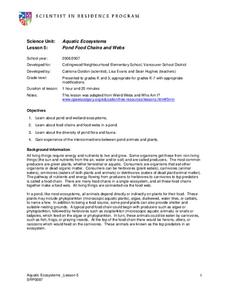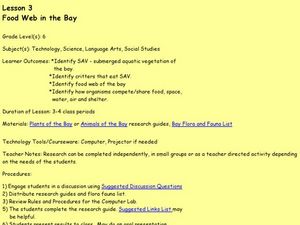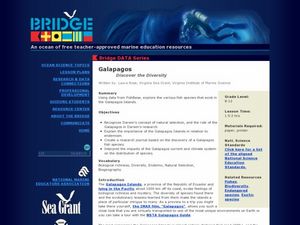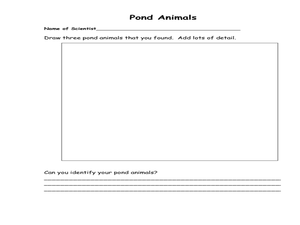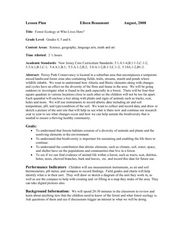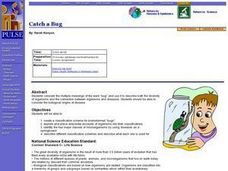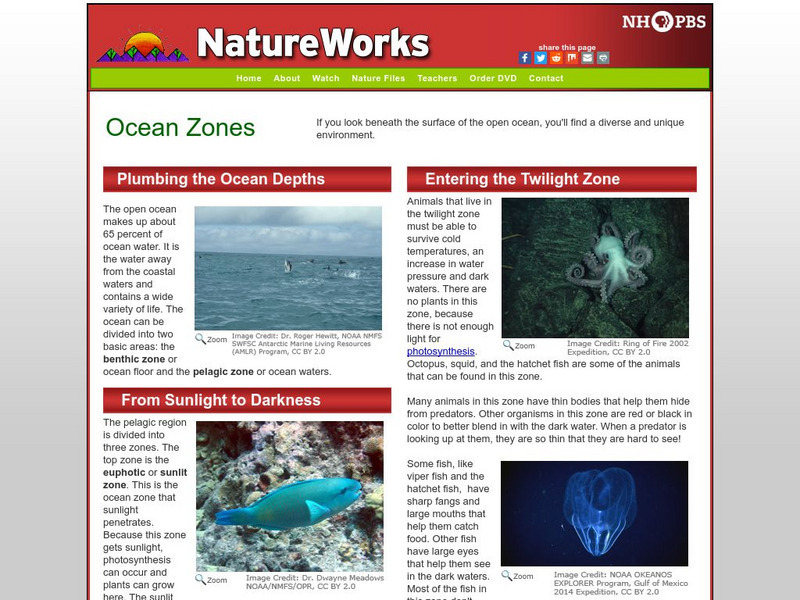Curated OER
Introduction to Watsonville Wetlands
Identify the different plants and animals found in wetlands, your class will explain the importance of wetland ecosystem and locate the different wetlands in their area.
Curated OER
Water is Life
Krill is a very small ocean animal that is key to keeping the ocean ecosystem going. The class reviews food webs and chains, learns about the importance of krill, discusses krill anatomy, builds a model of a krill, and then has a...
Curated OER
Aquatic Ecosystems
Students study the diversity of marine life and their habitats. For this aquatic ecosystems lesson students complete a lab activity and experiment.
Curated OER
Adaptation and Diversity on Sheffield Island
Written for an exploration of shoreline ecosystems on Sheffield Island, this gives ecology or marine biology buffs a hands-on experience. Using GPS or visual triangulation techniques, they lay transect lines on a high and a low energy...
Curated OER
Aquatic Ecosystems
Students study ponds and wetland ecosystems and examine the food chains and webs in them. In this aquatic ecosystems lesson students answer questions about the diversity of the flora and fauna in a pond.
Georgia Aquarium
The Ocean's Nursery
Linear perspective, estuaries, and water ways converge in a science-inspired art project. The class uses what they've learned about eco-systems, estuaries, and the food chain to create scale models of a local marsh. While the lesson...
Curated OER
Food Web in the Bay
Sixth graders study the food web in a bay. In this food web lesson, 6th graders investigate the SAV- submerged aquatic vegetation of a bay including their predators, and how the organisms eat, have proper living space and water. They...
Curated OER
Galapagos - Discover the Diversity
Pretend you are exploring a newly discovered species of fish in the Galapagos. Your budding marine biologists access FishBase Database's list of marine/brackish fishes and choose one to research. The link through this website does not...
Curated OER
Marine Field Trip to Whytecliff Park
Pupils study the intertidal habitat, tidal pools and the organisms that live in them. In this aquatic ecosystems instructional activity students take a field trip and experience first hand the local seashore environment.
Curated OER
Pond and Pond Organisms
Students explore pond ecosystems. In this pond organism activity, students will use pond water and a plastic bad in order to locate and identify freshwater organisms. The activity is designed for younger grades, but...
Curated OER
environment: Fresh and Saltwater Habitats
Students compare and contrast fresh and salt water coastal environments. After describing how sea animals adapt to their habitats, they design a variety of sea creatures and explain how the adaptations aid in the animals' survival. ...
Curated OER
Forest Ecology or Who Lives Here?
Students explore a hardwood forest. In this forest ecology lesson, students examine the diversity and animals and plants as they explore their habitats at Poricy Park Conservatory. Students determine how biodiversity and abiotic elements...
Curated OER
Arsenic and Human Health
Ninth graders concentrate on arsenic poisoning as an example of the connections among health, geography, and geology as they develop a persuasive presentation about the dangers of arsenic in the drinking water, targeting a specific...
Curated OER
Oh, the Regions
Focus on the geography of Oklahoma. In this activity, learners compare different geographic regions in Oklahoma, create a collage to share their results, and identify important landforms throughout the United States, such as the...
University of Connecticut
Building Your Own Biosphere
On September 26, 1991, four women and four men entered the scientific experiment, Biosphere 2; the doors were sealed for two years in order to study the interactions of a biosphere. In the activity, scholars explore biospheres by...
Curated OER
Ecosystem Interactions in Refuges
Seventh graders, using national parks as models, illustrate the energy flow in ecosystems. Working in groups, they use murals, flow charts, or other visual displays to record their findings. Students represent the food chains and webs...
Curated OER
Observation Hike
Students participate in an observational hike to study the natural surroundings. In this observational hike instructional activity, students hike through a state park and observe the plant and animal life. Students learn...
Wonderville Media
Wonderville: Deep Sea Creatures
We all know that the ocean is home to many beautiful and mysterious creatures. Mysterious cannot begin to describe the fish living in the depths of the ocean. Imagine the kind of creature that lives thousands of feet underwater! Sunlight...
NOAA
Noaa: Estuaries: Noaa: Science Data: Graphing
Create graphs of marine ecosystems using real-time data.
Smithsonian Institution
National Museum of Natural History: Ocean Planet
Detailed website that was a companion to a 1995 traveling exhibit of the Smithsonian. Links to lesson plans and other educational materials are at the bottom of the page. Enter the exhibition to explore the world of the ocean.
PBS
Nh Pbs: Nature Works: Ocean Zones
Discover more about the underocean environment at this site that surveys animals, environmental factors such as light and temperature, currents, animals, plants, and the like.




